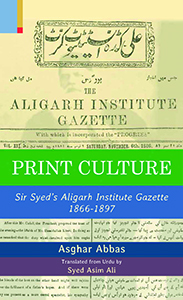
Print Culture: Sir Syed’s Aligarh Institute Gazette, 1866-1897
AUTHOR – Asghar Abbas
| HB ₹995 . $49.95 . ₤32.95 |
||
INFORMATION
- AUTHOR : Asghar Abbas
- ISBN : 978-93-84082-29-1
- Year : 2015
- Extent : xii + 200 pp.
- Discount available on checkout
- Usually dispatched within 3 to 5 working days.
Print Culture
| HB ₹ 995 . $ . ₤ |
PB ₹ . $ . ₤ |
|
| POD ₹ . $ . ₤ |
e-Book ₹ . $ . ₤ |
INFORMATION
- AUTHOR – Asghar Abbas
- ISBN – 978-93-84082-29-1
- Year – 2015
- Extent: 400 + 40 coloured illustrations
- 10% discount + free shipping
- Usually dispatched within 3 to 5 working days.
This book is based on a critical study of The Aligarh Institute Gazette covering the period 1866-97, a phase when India was slowly transiting to the modern age, with the spread of new political, social, educational and religious ideas. Numerous social movements too, were gathering steam during this period to reform the Indian society. Sir Syed Ahmed Khan, the founder of The Aligarh Institute Gazette, fought against obscurantist ideas and persuaded the Indian people to accept the impending changes.
Print Culture: Sir Syed’s Aligarh Institute Gazette begins with a brief account of the life and achievements of Sir Syed. It goes on to examine the role of the Scientific Society, that remained active from 1864 to 1884. During this period the Scientific Society held regular meetings highlighting the need for social, educational and political reforms and attempted to develop a scientific temperament amongst the people. The Aligarh Institute Gazette was an organ of the Scientific Society, and very soon it became popular throughout the subcontinent. An important feature of the Gazette was its editorials penned by Sir Syed himself on social and educational reforms. They set the tone and style of editorial writing in Urdu journalism. This book is an important contribution to the understanding of Urdu journalism and throws light on the ideas and character of Sir Syed. It judiciously assesses the man who worked hard to achieve unity between the people of India, and fills the gaps in our understanding of Sir Syed’s ideas.
The Author
Asghar Abbas retired as Professor and Chairman, Department of Urdu, Aligarh Muslim University in 2003. He also served as Director, Sir Syed Academy, Aligarh Muslim University from 2002 to 2008. He has contributed more than 150 articles on the literary, cultural and social changes taking place in nineteenth century India. He has also authored more than a dozen books on eminent men of letters and social reformers of India.
This book is based on a critical study of The Aligarh Institute Gazette covering the period 1866-97, a phase when India was slowly transiting to the modern age, with the spread of new political, social, educational and religious ideas. Numerous social movements too, were gathering steam during this period to reform the Indian society. Sir Syed Ahmed Khan, the founder of The Aligarh Institute Gazette, fought against obscurantist ideas and persuaded the Indian people to accept the impending changes.
Print Culture: Sir Syed’s Aligarh Institute Gazette begins with a brief account of the life and achievements of Sir Syed. It goes on to examine the role of the Scientific Society, that remained active from 1864 to 1884. During this period the Scientific Society held regular meetings highlighting the need for social, educational and political reforms and attempted to develop a scientific temperament amongst the people. The Aligarh Institute Gazette was an organ of the Scientific Society, and very soon it became popular throughout the subcontinent. An important feature of the Gazette was its editorials penned by Sir Syed himself on social and educational reforms. They set the tone and style of editorial writing in Urdu journalism. This book is an important contribution to the understanding of Urdu journalism and throws light on the ideas and character of Sir Syed. It judiciously assesses the man who worked hard to achieve unity between the people of India, and fills the gaps in our understanding of Sir Syed’s ideas.
The Author
Asghar Abbas retired as Professor and Chairman, Department of Urdu, Aligarh Muslim University in 2003. He also served as Director, Sir Syed Academy, Aligarh Muslim University from 2002 to 2008. He has contributed more than 150 articles on the literary, cultural and social changes taking place in nineteenth century India. He has also authored more than a dozen books on eminent men of letters and social reformers of India.




